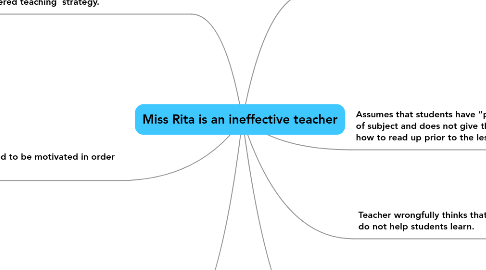Miss Rita is an ineffective teacher
by pbl nie

1. Teacher is wrong to be skeptical of using ICT in the classroom because it is a good student centered teaching strategy.
1.1. ICT is conducive to meaningful learning (Kailuo)
1.2. provides real-world contexts
1.3. Provides tools that can help students visualize and analyze
1.4. Provides students with the chances to reflect and obtain feedback from others
1.5. encourages hands-on work from students
1.6. - Bransford, Brown, & Cocking, 1999 - How People Learn
2. Students need to be motivated in order to learn well.
2.1. Motivating students (Kailuo)
2.2. Two types of motivation:
2.3. extrinsic – there is a reward at the end of the task. Rewards are good for short-term learning.
2.4. intrinsic - doing the action for its own sake. This is better for long-term learning.
2.5. - Santrock
2.6. Causes of demotivation (Kailuo)
2.7. Social – absence of positive relationships (Stipek), threats (Jensen), unconducive home environment
2.8. Teachers can offer supportive ear and be sensitive to students’ needs (McCombs)
2.9. Cognitive – lack sense of mastery (Dweck), feel helpless (Bandura), feel the work Is irrelevant and dull
2.10. Teachers can give positive verbal reinforcements (Cameron), make the work relevant and build students’ self-efficacy
3. A teacher’s own attributes and attitude affects how the class learns.
3.1. Characteristics of an effective teacher (Ting Ee)
3.2. Recognizes complexity
3.3. Communicates clearly
3.4. Serves conscientiously
3.5. A reflective practioner
3.6. A continuous learner
3.7. - Stronge
4. The teacher is not communicating effectively
4.1. Strategies for effective classroom communication (Samsiah)
4.2. There are three main elements namely oral communication, non-verbal communication and listening. (Eds: Quek, Wong & Tay, 2008)
4.3. Oral communication – teacher should be audible, use and clarify appropriate words and sentence structures, and enunciate words properly.
4.4. Non-verbal communication - this involves eye contact with students, appropriate facial expressions, body language (gestures), posture and also the distance between teacher and students
4.5. Listening - listening actively and reflectively through use of body orientation and maintaining eye contact to show that listener is interested. Be receptive to students’ messages.
5. Assumes that students have “pre-requisite knowledge of subject and does not give them clear instructions on how to read up prior to the lesson.
5.1. Schema Theory (Yvonne)
5.2. Teacher needs to activate student’s schemata in order to teach them new information - based on the research of schema theorists eg. Richard Anderson
5.3. Scaffolding (Yvonne)
5.4. Teachers should scaffold so students can build on what they know to reach a new level of knowledge.
5.5. - Lev Vygotsky
6. Teacher wrongfully thinks that “fun” activities do not help students learn.
6.1. The Psychology of Play (Yvonne)
6.2. Students should be allowed to learn through real-life examples and through play so they can understand abstract principles .
6.3. - Lev Vygotsky
7. Teacher is not asking the right questions or doing it in the right way.
7.1. The right way to question (Hafez)
7.2. Teacher must bear in mind:
7.3. Who to ask
7.4. How to frame the question
7.5. How to probe
7.6. How to respond to students’ questions.
7.7. How to sequence the question
7.8. What not to ask.


